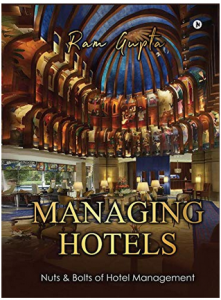The COVID-19 pandemic has left no corner of our lives untouched. It is undeniable that the world has never faced a crisis on this large a scale before. Businesses all across the globe are being forced to shut down due to lack of operations, revenue, and support. Probably the hospitality industry has been hit the hardest. Travel restrictions all over the world have led to cancellations and empty hotels, with no telling how and when the situation may stabilize enough those things may return to normal.
While the challenges in the current scenario may seem insurmountable, the hotel industry has repeatedly overcome similar downturns in the past and I am confident that it will recover from this one as well. It will take time, no doubt, but the hospitality sector will pull through. Here are some reasons why
The Travel Bug, Intensified
If there is one thing the past few months have led to, it’s the build-up of restlessness and an ever-increasing desire to get out of our homes. It goes to show that once the situation becomes safer and the rules are relaxed, there will be many itching to leave their confining environments behind for a much-needed break. We may see a rise in demand for experiential packages and stays, such as spas and retreats, as people try to move on from the pandemic and enjoy the luxuries of life once again.
It’s probable that international travel will stay on the low for at least a few months after the pandemic due to public apprehension and financial barriers. However, we can expect local travel and short getaways to become more popular during the initial recovery days as people take advantage of their regained freedom. We must also consider the various events, trade shows, and business travel that have been compromised during these months, which will resume post-pandemic, albeit slowly.
Learning from the Past
COVID-19 is not the first time a global crisis has led to empty halls and pockets. Many hoteliers have lived through past financial crises, and those who have not would certainly know of it. While it may be a bit too optimistic to say that hoteliers are ready to face this challenge head-on, it is undeniable that they are more prepared now than ever before.
While it may take longer for them to plan exactly what to do to recover, one thing there is plenty of insight into is what not to do during an emergency like this. Experiences and the wide availability of such knowledge will help them make better decisions, make their plan of actions, and avoid knee-jerk reactions like the kind of rate slashing that occurred due to the 2007 financial crisis.
Technology is the Way Forward
While the industry as a whole will be facing a significant financial setback, hoteliers now have access to more resources and technologies than ever to carry out creative solutions and recover their losses. Moreover, they have access to hundreds of case studies and expert advice at the tips of their fingers to help them get back on track and figure out a solution that best fits their business needs.

One key factor that may perhaps have a major hand in many hotels’ recovery is how they respond to customer fears and tailor their guest experience according to the paranoid post-corona environment. Innovations like mobile key will help in alleviating guest concerns and reducing contact between individuals, which will be particularly important in a post-social distancing environment. Those hoteliers that were early adopters of such technologies will benefit the most and will be particularly well equipped to weather the storm.
The Importance of Engagement
On a related note, hotels that are actively engaging with their customers through digital media will have the edge. After all, there is no use using all these technologies without communicating to your audience that you have them.
It is gratifying to see that many hotels are productively using this time to create better relationships with customers as well as tailoring their marketing and promotional strategies according to the situation. Hotels these days are more in tune with customer needs, and thus know exactly how to communicate with their audience to fulfill business goals. They have become quick to plan, adapt, and implement marketing strategies, which will definitely pay off once restrictions are lifted.
Long gone are the days where all marketing stood for was selling rooms; now hoteliers are aware that it’s selling experience that works—which is why hotels prioritizing customers even during the pandemic will fare well.
Shift in the Market
A major issue that the industry faces once things return to normal is public reluctance to travel to those areas that were hit the hardest during the pandemic, initially at the very least. Big hotel chains should be able to wait this out by focusing on other market segments that were not hit as bad from the virus, which is where travel for leisure might shift to until the scars from the pandemic heal. Meanwhile, small boutique hotels and homestays might become more popular due to people favoring stays with less of a crowd.
There is also a possibility that travelers will prefer the predictability and safety of traditional hotels once travel resumes, majorly because they can guarantee guests a dependably clean and safe stay. This will help hotels regain those customers who, in recent years, had started preferring services like Airbnb to traditional hotel stays.
One Last Note of Hope
Perhaps the biggest source of hope for despondent hoteliers may come from China, which is already showing signs of recovery after dealing with its own crisis. Slowly but steadily, Chinese business is returning to normal and the occupancy rate is increasing. Mainland China’s hotels achieved a 31.8% occupancy rate on 28 March, which is a dramatic rise from the 7.4% during the first week of February. Hotel reservations saw a 24% week-on-week increase between 30 March and 6 April.
Most recently, China’s capital Beijing relaxed quarantine rules, leading to a surge in searches and bookings for air travel and hotels. This bodes well for the rest of us when we are finally able to achieve this relative normalcy.
The one thing we must remember is that we are all in the same boat after this pandemic, many having to rebuild and even start from scratch. Hope comes from the undeniable fact that travel and tourism is far too ingrained in our lives to not return to normalcy once we are past this crisis. Yes, it will be slow going but there is no doubt that the industry will soon be back on its feet, with more experiences to learn from and better prepared for the future.
Ram Gupta is a hotel management graduate. He is a certified Hotel Administrator from U.S. and MIH from U.K. He has over 40 years of sound experience in the Hospitality industry in India, Dubai, U.K, Europe and Japan and is well versed with all areas of business including acquisitions, mergers, joint ventures, diversification, strategic planning, development and operations. He has been associated with over two dozen luxury and boutique hotel projects and has launched two hotel chains in India. He is currently an independent hotel consultant and could be contacted at ramgupta@bcgglobal.com. Website: www.bcgglobal.com
Hospitality Industry Books By The Same Author

Latest Release

ALSO ON,-
AMAZON KINDLE, KOBO, GOOGLE PLAY & i BOOKS
BOOK STORES IN INDIA
COFFEE CUP – SECUNDERABAD, CROSSWORD – BANGALORE, PUNE, JAIPUR & NOIDA, GANGARAMS – BANGALORE, HIGGINBOTHAMS – BANGALORE & CHENNAI, MODERN BOOK STORE – TRIVANDRUM, ODYSSE – COIMBATORE, OXFORD – DELHI & KOLKATA, STORY BOOK STORE – KOLKATA, TITLE WAVE – MUMBAI, WRITERS CAFÉ – CHENNAI

